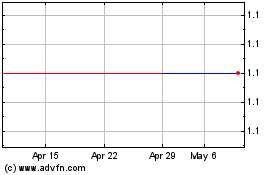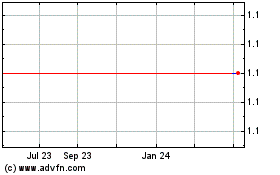U.S. Criticizes Germany's Support of New Russian Natural Gas Line
December 12 2017 - 7:14PM
Dow Jones News
By Paul Sonne
WASHINGTON -- The top State Department official overseeing
Europe offered harsh words Tuesday for Germany over the country's
continued support for a new Russian gas pipeline to Europe, while
praising Denmark for passing a law that could hamper the
project.
A. Wess Mitchell, assistant secretary of State for European and
Eurasian affairs, said the formation of a new government in Germany
offers an opportunity for the U.S. to make a renewed case against
the Russian pipeline, known as Nord Stream 2, which Washington says
will give Moscow more leverage over Europe's energy supply.
He said the new government gives the U.S. a chance to call on
Germany "to show responsibility in a European context."
"On energy security, Germany gets it wrong," Mr. Mitchell said
in testimony to the Senate Foreign Relations Committee, referring
to the country's support for the Russian gas pipeline. "And it gets
it wrong in a way that hurts other EU member states."
A spokeswoman for the German economics ministry declined to
comment on Mr. Mitchell's criticism of Germany. "For us, Nord
Stream 2 is a corporate project," said spokeswoman Tanja
Alemany.
Mr. Mitchell praised Denmark for a law allowing the country to
block pipelines from traversing its territorial waters on foreign
policy or security grounds.
Mr. Mitchell said that other countries whose territorial waters
would be traversed by the Russian pipeline are also considering
where they stand on the project, looking, for example, at the
environmental effects.
The Russian pipeline project, a wholly owned subsidiary of
Russian state energy giant Gazprom, would double Russia's export
capacity by adding a second link between Russia and Germany.
Secretary of State Rex Tillerson in a speech in late November
described the pipeline as unwise. He argued that Nord Stream 2 and
another Russian pipeline project known as TurkStream would only
increase market dominance for a single supplier to Europe, namely
Russia.
The opposition by Mr. Tillerson and the State Department
indicates how core tenets of U.S. foreign policy toward Russia have
continued, even though President Donald Trump has defended Russian
President Vladimir Putin's denial that Moscow interfered in the
2016 election, as U.S. intelligence agencies have concluded.
A $10 billion project, Nord Stream 2 had been planned as a joint
venture that includes Royal Dutch Shell PLC, Wintershall AG, Uniper
SE, OMV AG and Engie SA, but Polish regulators scuttled that
arrangement. The companies are still backing the project, even
though it is now wholly owned by Gazprom and based in
Switzerland.
Mr. Mitchell said Russia is well-versed in using energy supplies
as a weapon against Europe and its neighbors. A Russian sanctions
bill passed by Congress and signed by Mr. Trump earlier this year
included a provision that allows the U.S. administration to
introduce new restrictions against companies involved in Russian
energy projects such as Nord Stream 2.
Germany balked at the provision -- which permits new
restrictions rather than mandating them -- and accused the U.S. of
meddling in Europe's energy supply. Companies involved in the
project accused U.S. lawmakers of trying to shore up U.S.
liquefied-natural-gas exports to Europe by blocking the Russian
transport route.
Mr. Mitchell, asked whether the administration was taking
advantage of the new provision under the sanctions law, said the
State Department was continuing to express opposition on a regular
basis and promote alternatives to Nord Stream 2. But he said the
U.S. administration remained wary of breaking unity with European
counterparts on other Russian sanctions separate from the pipeline
dispute.
"We didn't want to open up new gaps between ourselves and allies
at a moment when we need to hold ranks on new sanctions across the
board," Mr. Mitchell said.
Sebastian Sass, Nord Stream 2 AG's European Union
representative, said the project was in the interest of European
energy security, contrary to Mr. Mitchell's argument. "It would be
absurd to claim that this cooperation is about using gas as a
political weapon," Mr. Sass said.
With plenty of capacity for liquefied-natural-gas imports to
Europe from several countries, Mr. Sass said, no supplier is in the
position to use gas supply as a vehicle for political
influence.
--Emre Peker in Brussels and
Andrea Thomas
in Berlin contributed to this article.
Write to Paul Sonne at paul.sonne@wsj.com
(END) Dow Jones Newswires
December 12, 2017 18:59 ET (23:59 GMT)
Copyright (c) 2017 Dow Jones & Company, Inc.
PJSC Gazprom (PK) (USOTC:OGZPY)
Historical Stock Chart
From Mar 2024 to Apr 2024

PJSC Gazprom (PK) (USOTC:OGZPY)
Historical Stock Chart
From Apr 2023 to Apr 2024
